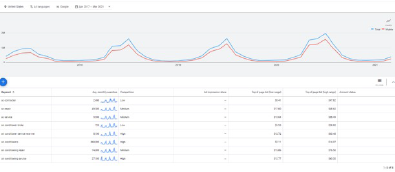
Keyword research has been at the core of digital marketing since the very start. If you have worked in the digital advertising world, you have likely performed keyword research many times before, or you have worked closely with marketers that have done keyword research.
Yet despite how well understood and developed the practice of performing keyword research is, there are many overlooked ways that professionals can leverage keyword data in less conventional ways. By not using keyword research as a form of broad market research, companies are missing an opportunity to get incredible insights into consumer behavior across time frames and locations.
Observing Trends & Interest in Topics Via Google Keyword Planner
The amount of data that can be gleaned from Google is rather incredible, and perhaps even a bit unsettling at times. Both paid advertising and organic search professionals regularly look at and observe search volume, often for baskets or groupings of keyword phrases. Yet the ability to view trends in these keywords is under-utilized in our opinion.
By viewing keyword trends and search volume, we can find seasonality, growing popularity, how popular a topic really is, and how one topic compares against another. Filtering on a regional basis then provides further data to understand differences in behavior across various locations.
Example Below: Using Google’s keyword planner, we took a basket of air conditioning repair, keyword phrases and created a plan around this. From this information, we can determine when we should be maximizing our resources and budget toward air conditioning search phrases.

Here are some ways trended, search volume data can be used outside traditional digital marketing channels:
- Get Better Data Around Product Seasonality Across Regions: Inventory planners and buyers can use keyword search volume to help plan when and where they may start to see accelerations or decelerations in demand for product. By looking at the history of search trends around various products, companies can gain an understanding of what time of the year they can expect to see increasing demand and can also gain insight into how consumer demand may change across different regions.
- Research Consumer Trends & Social Movements: Company executives can leverage search volume trends to gain insight into new consumer trends and interests, helping them make more intelligent decisions around how they expand their business and where they make investments. By tracking changes in interest in various topics, it is possible to get an estimate on how much interest actually exists around said topic, and whether this interest is still rising or not.
- Find Consumer Pain Points and Be the Solution: Product developers can leverage keyword insights to identify pain points and problems people are searching for online. Since search engines are essentially giant information and answer retrieval systems, people have made it a habit to Google solutions to problems both big and small. Companies may even find that consumers are using their products as solutions themselves, sometimes in ways they have never intended.
- Learn How Popular Your Brand Is: Companies and brands can gain a better understanding of how well their brand identity is performing by observing trends in search volume around their branded phrases and terms. Viewing these trends helps, but it can also be helpful to simply gauge the total volume of interest in your brand by viewing total search volume. You can get more granular by looking at this on a regional basis as well. Finally, the search volume of your branded search phrases can be compared against both competitor and benchmark brand phrases to gauge how popular your brand is online.
There are many other potential uses for keyword search data. Of course, there are some limitations set by how much data Google will release (which often depends on ad spend with Google directly). But as we all know, even a small amount of information can go a very long way, especially when we can view that information on a regional basis and on a time-trended basis.
In short, keyword research can be viewed as a form of free on-demand market research to gain insight into what people are thinking, saying, and the information they are looking for on a trended and regional basis.

